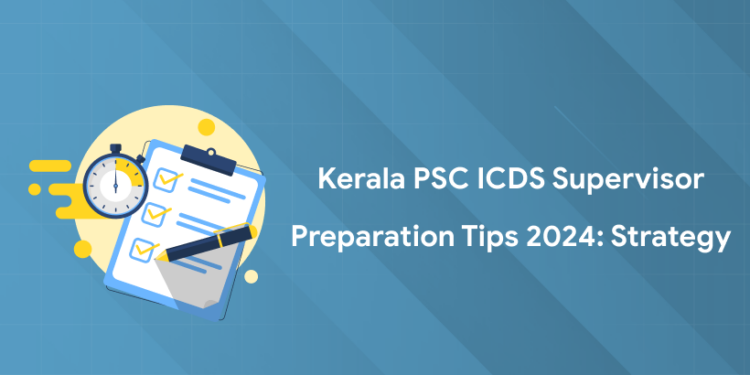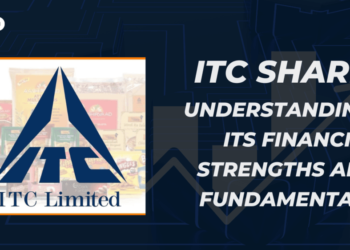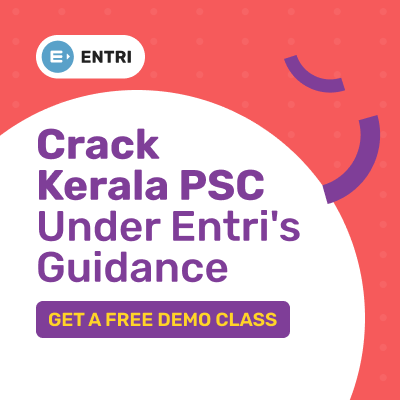Table of Contents
ICDS (Integrated Child Development Services) an extemporary of the government of India that regulates the basic necessities like food, preschool, primary education, health care, health checkups, immunization and referral facolities for children under 6 years and their mothers. This scheme was first launched in 1975 and was again relaunched by the tenth 5 year plan. This plan was also linked with Anganwadi centers which were established mainly in the rural areas to foster child and mother nutrition, health care and elementary education to the weaker sector of the society.
ICDS SUPERVISOR ONLINE COACHING – FREE DEMO
Kerala ICDS Supervisor Recruitment 2024 – Overview
| Kerala ICDS Supervisor Recruitment 2024 Latest Notification Details | |
|---|---|
| Organization Name | Women and Child Development Department |
| Job Type | Kerala Govt |
| Recruitment Type | Direct Recruitment |
| Cat No | 245/2023 |
| Post Name | Supervisor (ICDS) |
| Total Vacancy | Anticipated Vacancies |
| Job Location | All Over Kerala |
| Salary | Rs.37,400 -79,000 |
| Apply Mode | Online |
| Application Start | 15th September 2023 |
| Last date for submission of application | 18th October 2023 |
| Official website | http://wcd.kerala.gov.in/ |
Kerala PSC ICDS Supervisor Previous Year Question Papers PDF
1: Which Year First Assembly Election was held in Kerala?
| Year of Exam | |
| 2013 | |
| 2017 | |
| 2020 |
How to Prepare for Kerala PSC ICDS Supervisor Exam 2024
Planning your preparation is the most important step that must be followed without fail. We have curated some of the best ICDS Supervisor Exams Study Preparation tips for all the aspirants so that you can plan accordingly.
1. Know the Exam Pattern and Syllabus Thoroughly
The most important ‘Study Tips for Kerala PSC ICDS Supervisor Exams’ constitutes being thorough with your syllabus. Knowing what topics are expected in the exam makes it easier to filter out topics into easy and difficult categories. Since difficult topics need more time and attention, candidates can allot time to specific topics as per the difficulty level accordingly, so that you are thorough with each and every topic. Knowing the exam pattern also is effective because you are aware of the weightage each subject or topic carries. This is extremely essential as it helps you understand how much time you should dedicate to a topic.
2. Prepare a Timetable to Ease Your Preparation
Preparing a timetable has been the go-to step for every student’s exam preparation since one can remember, and this is because it is effective. To complete the entire portion on time, candidates can allot a specific number of days to a subject before even starting with the Kerala PSC ICDS Supervisor Exam Preparation, so that you have a rough idea as to when you finish studying. A few days must be allotted for revision, right before the examination.
3. Give Utmost Importance to Revision and Practice
Revision is the most vital step before the exam. Candidates must allot specific time for revision so that they don’t forget the topics studied previously. Candidates can also make notes while studying so that the revision process gets easier. Alongside revision, candidates can also attempt mock tests to brush up on the topics. Attempting previous years’ question papers is always a good idea since it can give you a fair idea of the type of questions that can be asked in the exam. You can also time yourself while attempting the question papers so that you can improve on your speed to complete the paper in time, if necessary.
4. Never Overwork Yourself
Take frequent breaks between studying so that you don’t put excessive strain on yourself. Make sure that you maintain a proper sleep schedule and diet, messing them up to study slightly more will never help because you will get tired easily. Instead, sleep for a sufficient time and wake up energized. During your study breaks, you can go out for a walk to get some fresh air, which will help you feel more energized.
5. Refer to the Best Study Material Available
Before starting with your Kerala PSC ICDS Supervisor Exam Preparation, you must ensure to get the correct books so that all the topics get covered. Refer to some of the authentic books to get a head start on your exam preparation.
Kerala PSC ICDS Supervisor Mock Test 2023-2024
Kerala PSC ICDS Supervisor Exam Pattern 2024 (Expected)
We have observed that many applicants are searching the internet for the Kerala ICDS Supervisor Exam Pattern 2024. For such candidates, we have given the entire Kerala PSC Exam Pattern 2024 here in this section. Take your time and look at the table below and collect the necessary data. We have given the details like the mode of exam, number of marks, number of questions, name of the subjects, and duration of the exam which indeed helps the aspirants get the highest score in the examination. Knowing the structure of the paper helps the aspirants prepare well for the exam. So, make use of this data and get a good score in the exam.
- The mode of this exam is online (objective Multiple Choice).
- The maximum mark for this exam is 100.
- The medium of the exam is English.
- The duration of the exam is 1 hour 30 minutes.
- The questions are based on education qualification.
| Part | Name of the Subject | No. of Marks |
| Part I | Home Science | 25 marks |
| Part II | Sociology | 25 marks |
| Part III | Social Work | 25 marks |
| Part IV | Psychology | 25 marks |
| Total Marks | 100 Marks | |
Kerala PSC ICDS Supervisor Syllabus 2024 (Expected)
Detailed Syllabus of ICDS Supervisor Post is attached below.
PART I: HOME SCIENCE
1.Physiology and Micro biology
Digestive system, Cardio Vascular System and Reproductive system. Food Microbiology, food poisoning, food spoilage, food born infection, Diseases caused by Microorganism (a) Bacterial Pneumonia, Meningitis, Cholera, Syphilis, Diphtheria, Leprosy (b) Virus – AIDS, Rabies, German measles, Measles, mumps, polio mellitus (c) Amoebic dysentery, malaria
2. Child Development and Welfare
The neonates – Characteristics, abilities and adjustments, reflexes- agar test, neonatal care -Immunization, – Breastfeeding Advantages. Importance of early stimulation, Discipline and guidance for children, preschool education – objectives, types, pre-school personnel, preschool records. Child-rearing practices of parents, parental attitudes, and families influence the personality and behaviour development of children. Responsible parenthood (acceptance, injection and over protection), Population education definition problems of overpopulation, small family norm, family planning, sex education, STD.
3. Human Nutrition and dietics
Good Nutrition, Malnutrition, balanced diet, RDA, Carbohydrates, Proteins, Lipids, vitamins and minerals— Classification, functions, Sources and deficiencies, dietary fibre, Diet in fevers, Diarrhoea,
constipation, Pregnancy, Lactation, Pre-school and adolescents. Meal planning, Therapeutic nutrition, Important National and International agencies.
4. Extension education and communication
Extension Education, definition, need principles, philosophy, difference between formal, informal and extension education. Community development – objectives, history of community development programmes in India, Poverty alleviation programmes in India. Programme development – Planning execution and evaluation. Communication methods, Audiovisual aids – classification.
5. Basic food science
Food groups, cereals and cereal products, pulse and legumes, nuts and oil seeds, vegetables and fruits, milk and milk products, Meat, fish, egg and poultry, Beverages, spice and condiments – composition and nutrient value, selection of these foods and storage.
PART II: SOCIOLOGY
1. Family –
Nature, composition, characteristics, types.- Patriarchal and matriarchal family Joint family, extended family, nuclear family, merits and demerits of joint family Disintegration of joint family in India, changing role of family, modern trends.
2 . Social Problems –
Domestic violence, alcoholism, dowry, dowry deaths, legislations related To dowry drug addiction, child labour, child abuse, rights of children, violence against Women , problems of the elderly, social psychological and economic, social security measures Educated unemployment, and underemployment.
3. Developmental Issues –
Poverty alleviation programmes, consumerism, rural-urban Disparities, Environmental degradation- air pollution, water pollution, solid waste management, climatic change, problems of induced displacement- social, economic, and cultural problems of displaced people.
4. Women and Development
Women in governance, gender issues, empowerment of Women, participation of women in socio-political activities, women in panchayat raj Institutions, and the role of self-help groups in the socio-economic development of women.
5. Tools and Techniques of data collection-
Primary and secondary data, observation-Participant and non-participant, interview schedule, questionnaire, structured and Unstructured, open and closed questions and case study method.
PART III: SOCIAL WORK
1. Developmental Psychology (Human Behaviour in Social Environment):
Growth vs. development -developmental task (by Havighurst) – the biophysical, psychological and socio-cultural changes happening during life span – Prenatal, Early Childhood, Late Childhood, Puberty, Adolescence, Young Adulthood, Middle Adulthood and Old Age– Hazards
2. Developmental Welfare Needs across the Life Span:
Prenatal care -immunisation – breastfeeding – parenting – preschool education – sex education and menstrual hygiene – prevention of substance abuse – vocational guidance – premarital counselling – career guidance and planning – retirement planning– bereavement
3. Family Counselling:
Family as an Institution – dysfunctional families – Family Systems Theory – Enmeshment and Boundaries -Issues: separation, divorce, remarriage -Family Life Cycle: Independence, Coupling (marriage), Parenting: babies through adolescence, Launching adult children, Retirement – Family and Couple Therapy
4. Working with Groups –
Groups – Types of groups: in-groups, out-groups, primary, secondary and reference – Group Dynamics: dyads and triads, competition, conflict, cooperation and cohesion, coercion, accommodation – Stages of Group Formation -Social Group Work (working with groups) – social group work process (Intake, Study, Diagnosis, Programme Development, Implementation of the programme, Evaluation)
5. Reproductive Health & Family Planning:
Adolescent Sexual Health (ARSH) – Contraception: temporary and permanent methods – factors affecting fertility – Infertility -STIs & HIV/AIDS – Safe Motherhood and Responsible Parenthood – Population Pyramids -Unwanted Pregnancy & Medical Termination of Pregnancy Act.
PART IV: PSYCHOLOGY
1. Introduction to Psychology:
Psychology approaches to psychology: structuralism-functionalism-behaviorism-Gestalt psychology. Biological – psychoanalytic -Humanistic – Cognitive approaches-methods in psychologyobservation- case study-survey and experimental methods.
2. Biological basis of behaviour, Brain and Behaviour-
neuron structure of neuron synapse- neurotransmitters-CNS- Sensory and motor processing- cortical localization, localization of language, localization of perception.
3. Sensation Perception and Consciousness:
Sensory thresholds subliminal perceptions colour perception-cues-Perception of form, pattern or objects figure and Ground-0 contour-perceptual constanciesSize-shape- orientation-brightness-lllusions-type of illusions- ESP-states of consciousness-biological rhythms-dream and sleep-ASCmeditation.
4. Psychological Processes :
Learning: classical conditioning-operant conditioningcognitive learning-observational learning-Memory:
encoding-storage and retrieval process-sensory, short term and long term memories-chunking- working memory semantic and episodic memory-explicit and implicit memory forgetting: decay interference repression-amnesia-mnemonics-cognitive process-Images and concepts prototypes- language-deductive and inductive reasoning decision making- problem solving-motivation-need, drive, incentives biological and psychological motive hierarchy of needs-extrinsic and intrinsic motives-intelligence-concepts of IQ.
5. Personality and Abnormal Behaviour:
Approaches to personality Major ideas of Freud’s theory- assessment of personality-self report projective measures-DSM-ICD classification-anxiety disorders-mood disorders- schizophrenia-personality disorders.
Ace Your Preparation For KPSC ICDS Supervisor Exam!Free Demo!
Kerala PSC ICDS Supervisor Study Materials 2024
General Awareness Books
| Books | Publisher |
| Quantitative Aptitude for Competitive Examinations | R S Aggarwal |
| A Modern Approach To Logical Reasoning | R S Aggarwal |
| BlackBook of General Awareness January 2023 | Nikhil Gupta |
Basic Computer Knowledge Books
| Books | Publisher |
| 99 Reasoning & Computer Aptitude Topic-wise Previous Year Solved Papers for IBPS/ SBI/ RRB/ RBI Bank Clerk/ PO Prelim & Main Exams (2010 – 2023) 7th Edition | PYQs for all Bank Exams| | Disha Experts |
| Computer Awareness – A complete book on Computer Aptitude for All Competitive exams and College Freshers (English) | N K Gupta |
| Computer Knowledge for Competitive Exams | Dr. P.K. Pandey and Ms Shreya Pandey |
Mathematics Books
| Books | Publisher |
| Handbook of Mathematics | Arihant Experts |
| Arithmetic Subjective And Objective For Competitive Examinations | R S Aggarwal |
| Magical Book on Quicker Maths | M Tyra and K Kundan |
English Books
| Books | Publisher |
| English for Competitive Examination | Wren & Martin |
| S. Chand’s Objective General English for All Central & State Level Competitive Exams | ssc english book | ssc cgl english book | Fully Revised Video Edition Latest 2023 | Dr. R S Aggarwal |
Kerala PSC ICDS Supervisor Study Materials – Other Important Sources
In addition to the above mentioned books candidates can use a number of other study materials to prepare for the exam. Our Entri offers several tests, practice exams, and other materials to help you ace your exam while helping you study in accordance with the exam format.
- For those candidates preparing for the test, the KPSC ICDS Supervisor Previous Year Papers would be helpful as they will give the candidates an idea about the type of questions that will be asked.
- In addition, students can access the KPSC ICDS Supervisor practice tests and test series for improved KPSC ICDS Supervisor Exam preparation.
- Candidates can access the online coaching and courses for the KPSC ICDS Supervisor.
Kerala PSC ICDS Supervisor Exam 2024 – Preparation Strategy
- Time management: To pass the KPSC ICDS Supervisor exam, applicants must manage their time well. Give yourself enough time to rest and study
- Prioritizing your strong areas: Candidates are advised to re-revise the topics which they are confident in as it will increase their confidence and allow you to spend less time in solving the questions in exam.
- Solve papers from previous years: It will assist the applicants to prepare appropriately by providing insight into the kinds of questions that will be asked.
- Prepare notes: The candidates will be better able to swiftly recollect the subjects. The applicants will benefit from having access to the content in one location thanks to the combination of the best explanations from numerous books and other sources.
- Use graphical learning to help: The applicants can benefit from the use of graphs, diagrams, tables, images, and mnemonics to help them easily remember the topics.
- Try practice exams: It will assist the candidates to control their speed and identify their weak points.
FAQ’S
Q: What is the age limit to apply for ICDS Supervisor Vacancy 2024?
Ans: 18 – 36, Candidates born between 02.01.1987 and 01.01.2005(both dates are included) are eligible to apply for this post, with usual relaxation to Scheduled Caste, Scheduled Tribes and Other Backward Communities
Q: What is the educational qualification required to apply for ICDS supervisor in Kerala?
Ans: (1) Degree in Sociology/Social Work, Home Science or Psychology of a recognized University.
OR
(2) A Degree in any other discipline of a recognized University along with Balasevika Training certificate
(One Year Course) issued by the Indian/State council for Child Welfare or any other recognised Institutions or Pre- Primary Teachers Training Certificate from Institutions recognized by the Government.
| Kerala PSC ICDS Exam Information Links | |
| Kerala PSC ICDS Notification | Kerala PSC ICDS Mock Test |
| Kerala PSC ICDS Syllabus | Kerala PSC ICDS Exam Date |
| Kerala PSC ICDS Previous Questions | Kerala PSC ICDS Study Materials |
| Kerala PSC ICDS Application Form | Kerala PSC ICDS Interview Questions |
| Kerala PSC ICDS Vacancy | Kerala PSC ICDS Job Profile |
| Kerala PSC ICDS Admit Card | Kerala PSC ICDS Salary |
| Kerala PSC ICDS Study Plan | Kerala PSC ICDS Preparation Tips |
| Kerala PSC ICDS Best Books | Kerala PSC ICDS Result |
| Kerala PSC ICDS Eligibility Criteria | Kerala PSC ICDS Cut Off |
| Kerala PSC ICDS Selection Process | Kerala PSC ICDS Exam Analysis |
| Kerala PSC ICDS Video Classes | Kerala PSC ICDS Answer Key |












